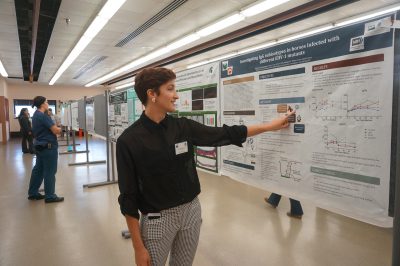Second-year student Rachel Baumgardner shares her experience with MSU's Summer Research Program and presenting at the College's 26th Annual Phi Zeta Day.
For DVM students, summers are a sacred time before their second and third years where you get to do whatever you choose with your time. Many of my classmates chose to travel abroad, volunteer, or gain exciting opportunities in clinical settings. Others took time off to spend with their friends and family. But for a handful of us, our summer consisted of more learning in the College’s Summer Research Program.
You might think that we were crazy, dear reader, to continue our intensive studies, given the level of intellectual difficulty we face during our semesters in school. And maybe we are a little crazy. But the opportunity to work closely with a lab and conduct our own research couldn’t be passed up. Many of us had never conducted research in a lab before, so we jumped at the opportunity. A few of us, myself included, had conducted research in the past and felt the itch to do it again.
As an undergraduate, I worked with Dr. Gisela Soboll-Hussey of the College’s Department of Pathobiology and Diagnostic Investigation on her Equine Herpesvirus-1 research. I helped PhD students conduct their research and care for the horses. This year, when Dr. Hussey gave me the chance to head my own project in the lab, I was excited to delve deeper into scientific research.

Applying for the Program wasn’t easy. We had to turn in a personal statement and resume, as well as information about our interests in veterinary medicine. Our projects were funded by various grants, and as a result, the application process was extremely competitive. The Program included DVM students and pre-medical students from across the country. Once chosen for a lab, the students started their positions only four days after final exams.
While other jobs might require a set number of hours, research has no “clock out.” Many summer nights were spent wondering why an assay wasn’t working, or writing and re-writing hypotheses, or analyzing data. And since our program was only a few months long, we were working at an accelerated pace. Each day consisted of multiple rounds of data collection, troubleshooting, and writing and studying scientific literature. At the end of the program, we presented our research results in Columbus, Ohio at the NIH-Merial Research Symposium. This October, we presented our research again at the College’s Phi Zeta Day.
Although at this point you might be certain that we’re all crazy for participating in a fast-paced and stressful summer program, we all felt the benefits. I learned a lot about how to frame my thinking around a central question, and I certainly learned how to deal with mistakes and mishaps along the way. The world of research is not forgiving, and sometimes it’s downright ruthless, but you’re never alone. The people who dedicate their lives to research are some of the most driven, compassionate, and intellectual individuals I have ever met.
